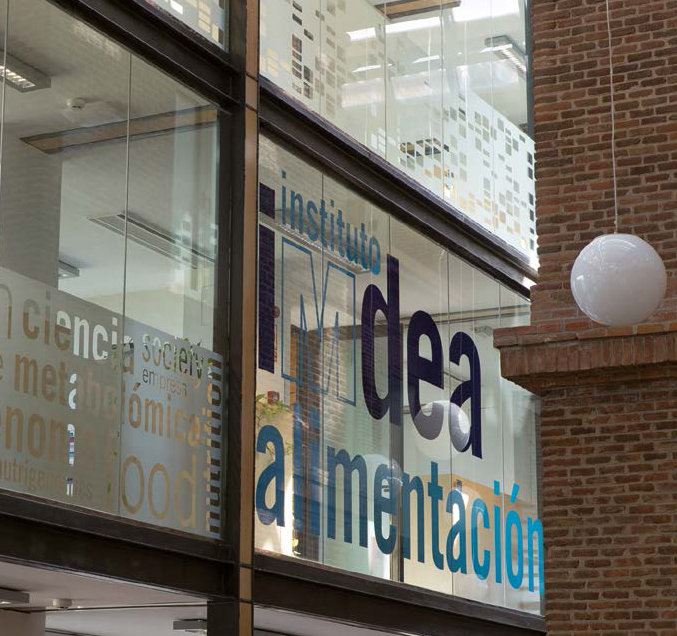Research projects > International Consortia
COST Action CA 16120. European Epitranscriptomics Network
Period: 2017-2021
Funding Institution/Programme: European Commission
COST Action CA18131 - Statistical and machine learning techniques in human microbiome studies
Period: 2018-2022
Funding Institution/Programme: European Commission
European Researchers’ Night
Period: 2018-2020
Funding Institution/Programme: : H2020-MSCA-NIGHT-2018-2019 and 2020 - MARIE SKŁODOWSKA-CURIE-Horizont 2020.
18249-20. Food System Master of Science Program (Education)
Partners: UAM, CSIC, Queen’s University Belfast, University Hohenheim, RethinkResource.
Period: 2018-2020
Funding Institution/Programme: EIT Food
18250-20. Global Food Venture Program (Education)
Period: 2019-2020
Funding Institution/Programme: EIT Food
18268-20. Human Capital (Cross-KIC Scheme)
Period: 2019-2020
Funding Institution/Programme: EIT Food
19029-20. The FutureKitchen Virtual Reality and EatingHealthy Video Infotainment Series (Public Engagement).
Period: 2019-2020
Funding Institution/Programme: EIT Food
19126-20 EFSET - European Food Systems Education and Training (Public Engagement).
Period: 2020
Funding Institution/Programme: EIT Food
19152-20. IValueFood (Education).
Period: 2019-2020
Funding Institution/Programme: EIT Food
19169-20. The #AnnualFoodAgenda (Public Engagement).
Period: 2019-2020
Funding Institution/Programme: EIT Food
19180-20 MAKE-IT! (Business Creation)
Period: 2019-2020
Funding Institution/Programme: EIT Food
19186-20 WE Lead (Education)
Period: 2019-2020
Funding Institution/Programme: EIT Food
20102. Curating citizen engagement: Food solutions for future generations (Education)
Period: 2020
Funding Institution/Programme: EIT Food
20357 Open call for online courses (Education)
Period: 2020
Funding Institution/Programme: EIT Food
20403 SPIN - SPermidin and eugenol INtegrator for contrasting incidence of coronavirus in eu population
Period: 2020
Funding Institution/Programme: EIT Food
Grant Agreement number: 863059 FNS-Cloud “Food Nutrition Security Cloud”
Period: 2019-2023
Funding Institution/Programme: H2020-SFS-2019-1 Call. EU Research and Innovation Framework Programme. Horizon 2020.
GLD18/00143 “Search for new biomarkers for diagnosis and stratification of NAFLD/NASH: can circulating exosomal mirnas play a role?”. Convenio VI Edición Becas Gilead a la Investigación Biomédica GLD18/00143
Period: 2019-2021
Funding Institution/Programme: Gilead Foundation.
How to effectively change food habits: innovative techniques and personalized nutrition approaches
Partners: University of Turin, Universidad Autónoma de Madrid, Grupo AN, University Hohenheim, University of Reading, University of Turin, BeYou
Period: 2019
Funding Institution/Programme: EIT Food
FOODMIO
Partners: University of Helsinki, University Hohenheim, Universidad Autónoma de Madrid, CSIC, Technion, Döhler, Grupo AN, Herbstreith & Fox
Period: 2019
Funding Institution/Programme: EIT Food
MOOC ‘Food, Agriculture and Plant Biotechnology’
Partners: University of Cambridge, Universidad Autónoma de Madrid CSIC, Herbstreith & Fox, John Deere, Koppert
Period: 2019
Funding Institution/Programme: EIT Food
An Introduction to Food Systems: Scientific, Technical and Socioeconomic Principles to Facilitate the Creation of Food Value Networks
Partners: Universidad Autónoma de Madrid, KU Leuven, Queen’s University Belfast, University Hohenheim, University of Reading, University of Turin, University of Warsaw.
Period: 2019
Principal Investigators: María Jesús Latasa (in collaboration with UAM)
EcoPack: Finding solutions to enable consumers and retailers to pack on-the-go items in grocery stores ecologically.
Partners: University Hohenheim, Universidad Autónoma de Madrid, University of Helsinki, Robert Bosch Packaging Technology, CSIC, Puratos, Vlevico, Tipa.
Period: 2019
Funding Institution/Programme: EIT Food
From waste to worth – use of plant residues
Partners: UAM, CSIC, Queen’s University Belfast, University Hohenheim, RethinkResource.
Period: 2019
Funding Institution/Programme: EIT Food
COST Action-POSITIVe
Interindividual variation in response to consumption of plant food bioactives and determinants involved (FA 1403)
Principal researcher: Dr. José María Ordovás Muñoz
Funded by: European Comission
Duration: 2014 - 2018
To combat the burden of cardiometabolic disease, which constitutes a major public health issue in Europe, it is of crucial importance to develop efficient strategies that target the dietary behaviors of European consumers and improve the food supply. Plant foods are rich sources of a large range of bioactive compounds that beneficially affect our health, particularly by decreasing the risk of cardiometabolic diseases.
POSITIVe specifically addresses inter-individual variation in bioavailability and physiological responses to consumption of plant food bioactives in relation to cardiometabolic endpoints.
COST Action
European Epitranscriptomics Network (CA 16120)
Principal researcher: Dr. Alberto Dávalos Herrera
Funded by: European Commission
Duration: 2017-2021
This COST Action aims at fostering the development of the emerging field of epitranscriptomics in Europe. By understanding the role of RNA modifications in physiology and pathology, novel and powerful disease biomarkers and drug targets could be identified. This will in turn lead to the development of a whole new class of diagnostic tools and targeted therapies, with particular attention devoted to cancer treatment. Furthermore, mechanistic understanding of this set of phenomena will allow to deepen our understanding of the contribution of post-transcriptional regulation of gene expression to proteome and thus phenotype variation.
By implementing collaborative efforts, data sharing and mobility-based learning opportunities, this COST action will accelerate discovery in the epitranscriptomics field and contribute to the ultimate realization of this vision. Tightly integrating biotech companies in this networking initiatives will be key to the complete achievement of the action goals and a considerable added value for the European biomedical sector, potentially offering a competitive advantage in the ensuing market.
Inflammarine
Anti-inflammatory and healing activity of sea cucumber (Isostichopus badionotus) in a murine model: characterization of pharmacological activity and cellular mechanisms involved (CB.2013- 01 No. 22173) involved (FA 1403)
Principal researcher: Dr. Alberto Dávalos Herrera
Funded by: CONACYT Consejo Nacional de Ciencia y Tecnología (Mexico)
Duration: 2015 - 2018
Uncontrolled inflammatory response is a major driver of many modern human chronic diseases. The natural world has been the source of novel anti inflammatory and other biologically-active agents. Plants, insects and marine organisms, including algae and invertebrate marine organisms, have been screened for the presence of anti-inflammatory agents. Sea cucumbers are marine invertebrates, considered by the traditional Chinese medicine as tonic foods, attributing them with a wide range of biological effects, including anti inflammatory. However, their mechanism of action is poorly described. Isostichopus badionotus, is a sea cucumber from the Peninsula of Yucatan (Mexico) whose many biological activities are not well characterized.
“inflammarine” aims to contribute to a better understanding of the anti inflammatory activity and mechanisms of action of the bioactive components of sea cucumber I. badionotus. Our results will allow the development of possible therapies from this marine invertebrate and support the search for therapeutic alternatives to combat the devastating consequences of the chronic inflammatory processes that today afflict our modern society
COST ActionCOST
Action CA17118
Principal researcher: Dr. Ana Ramírez de Molina
Funded by: European Comission
This Action aims at using innovative translational research to identify colorectal cancer biomarkers for personalized medicine that will improve screening, early detection and disease follow-up, and attain better tumor profiling, state-of-the-art functional characterization of genetic variants and new therapy approaches. It will be organized in the following working groups:
- Disease risk profiling applied to the optimization of current screening programs. Germline predisposition variants, environmental factors, epigenetics, microbiome and metabolomics biomarkers will be used to better select patients eligible to be screened. • Non-invasive biomarkers for early detection and disease follow-up. Circulating tumor cells, circulating tumor nucleic acids, tumor-educated platelets and exosomes will be explored in order to identify new tools for early detection and monitoring of the disease.
- Tumor profiling to identify biomarkers with prognostics and predictive value for patient stratification. Intra-tumor heterogeneity will be considered and tumor mutational profiling, epigenetics, single-cell genomics sequencing used as instruments to better inform tumor and precursor lesion characterization.
- Functional genomics and new therapies. Candidate genetic variants will be validated and routes to novel therapies for this disease will be conceived. To do so, cutting-edge approaches such as CRISPR-Cas9 and immunotherapy will be applied.
The network will bring together participants from different COST countries and will facilitate the research interaction and collaboration between research groups and enterprises interested in the described objectives. Diverse expertise includes clinical practice, germline and somatic genetics, epigenetics, bioinformatics, cell and molecular biology, microbiology, immunology, biostatistics, epidemiology, health economy and the industrial sector.
LIFETIME
Revolutionising healthcare by tracking, understanding, and treating human cells during diseases
Principal researcher: Dr. Ana Ramírez de Molina
Funded by: European Comission
LifeTime is expected to fundamentally impact basic science across multiple fields including developmental biology, regeneration, stem cell biology, RNA biology, epigenetics, signalling, cancer biology, neurobiology and metabolism. It will redefine the role of machine learning in basic science and precision medicine, which will be based on cellular biology and artificial intelligence.
The synthesis of 21st century biology and data sciences will impact medical practice and improve human health, reducing the economic burden of aging populations.
LifeTime will stimulate new developments in the healthcare sector, providing benefits to the EU economy in terms of business volume, jobs, and personal income for European households. The pharmaceutical industry in Europe will be strengthened by the general acceptance of targeted medicines. The implementation of innovative technologies in toxicology studies and improved patient stratification in clinical trials will lead to substantial savings in the cost of drug development. High-tech industries and the emerging AI sector will be boosted by the development of knowledge and technology that go far beyond the state-of-the-art in linking molecular analysis at single-cell resolution to early detection and interception of diseases, thus making Europe a leader in this key driver of future economic growth. European SMEs that develop instruments, software and systems for clinical-grade molecular sequencing, mass spectrometry, microscopy, image analysis and AI systems will spin off and flourish. Improved early disease detection and interception will enable healthier ageing, leading to substantial savings in healthcare expenses and care costs for the elderly.

